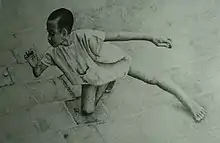Pitching pennies
Pigeon Toss, or in Britain Pap, Penny Up, and Pitch and Toss in Rudyard Kipling's poem "If -", Keeley (Scotland), "Nippy (Wales)", Chucks, Quarters, “Tinks” or "Jingies" is a game played with coins. Players take turns to throw a coin at a wall, from some distance away, and the coin which lands closest to the wall is the winner.

The history of the game is ancient, and it is known to have been played by Ancient Greek children using bronze coins.[1] In modern Israel the game is also played with Apricot kernels, and is called "Gogoim".
Modern London
In modern London schools the game has been named ‘Money up’ and the rules have slightly changed. Players still throw coins against a wall but usually £1 coins. Once all coins have been thrown players take it in turn from closest to furthest away to throw all coins above their head and call heads or tails, which ever they call they get to keep the coins facing that way. The next closest will then do it and so on until there are no coins left. If a coin is against the wall and floor at an angle when a player throws it they can call “Jimmy” or “Jimmy takes all” and they instantly win all the coins. There is also a rule where if someone calls ‘lard’ they go first and ‘butt lard’ they go second.
References
- Gulick, Charles Burton (1902). The Life of the Ancient Greeks: With Special Reference to Athens. New York, NY: D. Appleton & Co. p. 77. OCLC 415193.